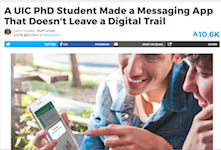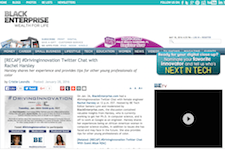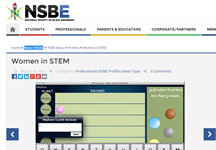-
Innovator. Researcher. {TBD}.
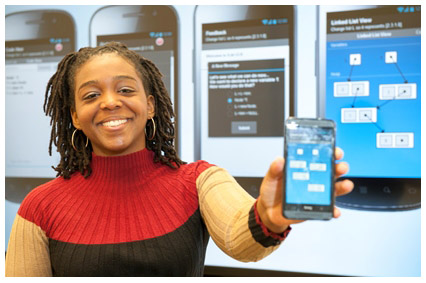
From St. Louis to Chicago
From my early days in St. Louis, MO up until my present time in Chicago,IL I have loved to both imagine and build. Computer science is the tool I now use to create. My creations are diverse ranging from this and other websites to more complex mobile applications and enterprise technology solutions. I travel across the country and overseas on a quest to learn, experience, connect, and synthesize. I currently research intelligent tutoring systems for computer science education in the Natural Language Processing Group at UIC. I am most certainly an innovator and researcher. The rest of my story is yet to be told. Enjoy the website.
Noteworthy Dates
15apr1st Place UIC Startup Challenge
Clean Slate Messenger, the privacy messaging platform for which I am founder and CEO, won 1st place in the UIC Startup Challenge !
11decPassed Disseration Proposal
I am so grateful to reach this milestone in my journey to obtaining my PhD!
-
Biography
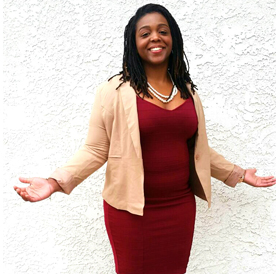
Rachel Harsley is a dreamer, an innovator, and a problem solver.
Her father purchased the family’s first computer when she was six years old and her love of technology has grown ever since. She is currently a PhD Candidate in the Department of Computer Science at the University of Illinois at Chicago. As a current member of the Natural Language Processing Group , under the direction of Professor Barbara Di Eugenio, she works on intelligent tutoring systems for CS education. Rachel received her B.S. in Computer Science from Vanderbilt University School of Engineering in 2011.
Rachel is passionate about helping others. She founded Maychild Technologies to connect small businesses and non-profits to technology solutions, particularly via web design and branding. In November of 2015, she launched Maychild Technologies’ entry into the app development industry with the release of Clean Slate Messenger. Clean Slate Messenger changes messaging by empowering people to share and delete messages with no message history on either device. Messages are sent letter by letter, instantly, just like an in-person conversation or a meeting on a shared whiteboard space.
Rachel enjoys technical challenges and has made her mark through significant contributions in software development internships at several major technology corporations including Google, Intel, AT&T, and GE. What drives her? A passion for helping others. Rachel dedicates time to speak at local Chicago schools and organizations to promote STEM studies and careers. She loves to inspires younger coders and entrepreneurs, especially underrepresented students.
Research Interests
More
-
Recent Press
Interview With Revision Path (Fall 2015)
Rachel shares her journey into computing, passions, and vision for future endeavours with Maurice Cherry of Revision Path.
University of Illinois (Spring 2014)
-
Dissertation Proposal
Summary: The standard paradigm of an Intelligent Tutoring System (ITS) exclusively affords one-on-one learning between a student and a computer tutor. My work shifts this paradigm to accommodate multiple-student computer-mediated learning. The work borrows from research in Computer Supported Collaborative Learning, ITSs, and the emerging computing industry standard of pair programming. My current research is motivated by my personal experience as an underrepresented student in the field with a strong desire to be connected to others as I learn CS. In particular, I propose to analyze how changes in ITS collaboration structuring influence learning and how support for pair programmers using the system can be computationally modelled. This writing details the background and related work in this area, describes the work completed to this point as well as plans for future research.
Download Paper (PDF)
Watch Presentation (YouTube Video)PhD Qualifier Exam (Written Critique and Presentation)
Abstract: This work critically reviews four recently published approaches to the emergent scientific literature on Collaborative Intelligent Tutoring Systems (CITS). The focus is threefold: 1) provide an overview of the fields of Intelligent Tutoring Systems and Computer Supported Collaborative Learning 2) review the four works and evaluate them in an organized way emphasizing main features, results, and contributions, 3) highlight gaps for possible research. Systematic analysis of the four approaches and other relevant literature led me to propose a CITS classification scheme with five dimensions: modeling, collaboration cues, group dynamics, pedagogical guidance, and technology. The three emergent classifications of CITS are unstructured, semi-structured, and fully structured. This scheme guides the evaluation of the writings. The reviewed literature suggests that all three types of CITS offer opportunities to improve student learning gains. However, the full extent to which these gains may be achieved is subject to future research.
Download Paper (PDF)
Watch Presentation (YouTube Video)
